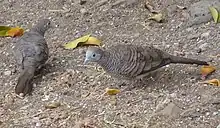| Geopelia | |
|---|---|
 | |
| Zebra doves (Geopelia striata) | |
| Scientific classification | |
| Domain: | Eukaryota |
| Kingdom: | Animalia |
| Phylum: | Chordata |
| Class: | Aves |
| Order: | Columbiformes |
| Family: | Columbidae |
| Subfamily: | Columbinae |
| Genus: | Geopelia Swainson, 1837 |
| Type species | |
| Geopelia lineata[1] Swainson, 1837 | |
| Species | |
|
See text. | |
Geopelia is a genus of small, long-tailed doves in the family Columbidae. They are native to South-east Asia and Australasia and are most often found in open country and scrubland. They feed mainly on seeds which they find by foraging on the ground. They typically lay two eggs in a simple nest of twigs and grass. Their plumage is mostly greyish-brown with a pattern of spots or bars. The zebra dove and diamond dove are commonly kept in captivity.
The genus was introduced in 1837 by the English naturalist William John Swainson with the zebra dove (Geopelia striata) as the type species.[2][3] The name of the genus combines the Ancient Greek geō- meaning "ground-" and peleia meaning "dove".[4]
The genus contains five species:[5]
- Diamond dove, Geopelia cuneata
- Zebra dove, Geopelia striata
- Peaceful dove, Geopelia placida (sometimes treated as a subspecies of G. striata)
- Barred dove, Geopelia maugeus (sometimes treated as a subspecies of G. striata)
- Bar-shouldered dove, Geopelia humeralis
References
- ↑ "Columbidae". aviansystematics.org. The Trust for Avian Systematics. Retrieved 2023-08-05.
- ↑ Swainson, William John (1837). On the Natural History and Classification of Birds. Vol. 2. London: John Taylor. p. 348.
- ↑ Peters, James Lee, ed. (1937). Check-list of Birds of the World. Vol. 3. Cambridge, Massachusetts: Harvard University Press. p. 100.
- ↑ Jobling, James A. (2010). The Helm Dictionary of Scientific Bird Names. London: Christopher Helm. p. 172. ISBN 978-1-4081-2501-4.
- ↑ Gill, Frank; Donsker, David; Rasmussen, Pamela, eds. (2020). "Pigeons". IOC World Bird List Version 10.1. International Ornithologists' Union. Retrieved 5 March 2020.
External links
- The Geopelia species Archived 2007-02-11 at the Wayback Machine
This article is issued from Wikipedia. The text is licensed under Creative Commons - Attribution - Sharealike. Additional terms may apply for the media files.